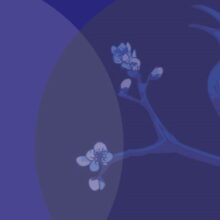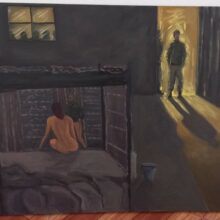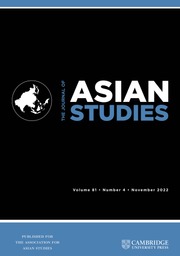- No longer published by Cambridge University Press
- ISSN: 0021-9118 (Print), 1752-0401 (Online)
Published for the Association for Asian Studies
The Journal of Asian Studies (JAS) has played a defining role in the field of Asian studies for over 75 years. JAS publishes the very best empirical and multidisciplinary work on Asia, spanning the arts, history, literature, the social sciences, and cultural studies. Experts around the world turn to this quarterly journal for the latest in-depth scholarship on Asia's past and present, for its extensive book reviews, and for its state-of-the-field essays on established and emerging topics. With coverage reaching from South and Southeast Asia to China, Inner Asia, and Northeast Asia, JAS welcomes broad comparative and transnational studies as well as essays emanating from fine-grained historical, cultural, political, and literary research. The journal also publishes clusters of papers that present new and vibrant discussions on specific themes and issues.
The Journal of Asian Studies (JAS) has played a defining role in the field of Asian studies for over 75 years. JAS publishes the very best empirical and multidisciplinary work on Asia, spanning the arts, history, literature, the social sciences, and cultural studies. Experts around the world turn to this quarterly journal for the latest in-depth scholarship on Asia's past and present, for its extensive book reviews, and for its state-of-the-field essays on established and emerging topics. With coverage reaching from South and Southeast Asia to China, Inner Asia, and Northeast Asia, JAS welcomes broad comparative and transnational studies as well as essays emanating from fine-grained historical, cultural, political, and literary research. The journal also publishes clusters of papers that present new and vibrant discussions on specific themes and issues.
Cambridge University Press will have ceased publication of Journal of Asian Studies on completion of Volume 81 / 2022. From Volume 82 / 2023, the Journal is published by Duke University Press. Please visit the new website here.
Back content remains on Core to fulfil our perpetual access obligations to previous subscribers only.
Featured Articles of the Month Theme - Philosophy
JAS on Facebook
Area Studies « Cambridge Core Blog

-
Meet the Editors: Tristan R. Grunow and Mary M. McCarthy, Editors for Asia-Pacific Journal
- 17 March 2025,
- We are pleased to introduce ourselves to the Cambridge Core family as the co-editors of Asia-Pacific Journal: Japan Focus. Tristan is a professor of modern...

-
Military Intimacies: Peruvian Veterans and Narratives about Sex and Violence
- 11 February 2025,
- Many researchers and writers have considered the question why soldiers in conflict situations rape civilian and enemy populations. Few works have been able...

-
The importance of open access publishing for the arts and humanities
- 20 December 2023,
- Between 2012 and 2014, I held a two-year Wellcome Trust Research Leave Award (WT096499AIA) for a project on women surgeons in Britain, 1860-1918.…
Fifteen Eighty Four | Cambridge University Press
-
Wine for the Life of the World
- 26 March 2025,
- Whether you’re a wine connoisseur or not, you’ve likely had a moment at a party or a dinner where someone poured you a glass and expected that you would know The post Wine for the Life of the World first appeared on Fifteen Eighty Four | Cambridge University Press....
-
The Invincible Gender Gap in Political Ambition
- 25 March 2025,
- Women in politics are everywhere. Vice President Kamala Harris quickly emerged as the Democratic nominee when Joe Biden dropped out of the presidential race The post The Invincible Gender Gap in Political Ambition first appeared on Fifteen Eighty Four | Cambridge University Press....
-
Getting Deterrence Right: Theory, Research, and Policy on the Punishment of Crime
- 21 March 2025,
- Deterrence has long served as a justification for legal punishment of crime. The logic? Fear of punishment will cause individuals, groups, organizations, The post Getting Deterrence Right: Theory, Research, and Policy on the Punishment of Crime first appeared on Fifteen Eighty Four | Cambridge University Press....



AAS on Facebook
Facebook - Politics
Twitter - Politics
Facebook: History